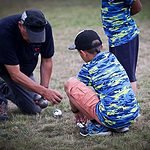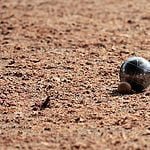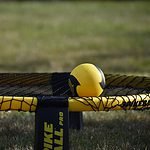You might be eager to return to the pickleball court after your rotator cuff recovery, but before you grab your paddle, consider this: the delicate balance between healing and pushing your limits.
What are the potential consequences of engaging in this dynamic sport post-surgery? Understanding the nuances of your body's recovery process and the impact of pickleball on your shoulder health is crucial.
Stay tuned to discover how you can navigate this post-injury pickleball journey with caution and confidence.
Key Takeaways
- Consult healthcare provider before resuming pickleball to assess shoulder readiness.
- Prioritize proper stroke mechanics and mindful play to safeguard rotator cuff.
- Opt for lighter paddle and modify gameplay to support shoulder healing.
- Gradual reintegration with focus on warm-up routines and listening to body signals.
Rotator Cuff Surgery Recovery Timeline

During your recovery from rotator cuff surgery, you'll typically wear a sling for 4-6 weeks post-operation. This period is crucial for your shoulder to heal properly.
Physical therapy plays a pivotal role in your recovery journey. Initially, the focus will be on gentle movements and exercises like pendulum exercises and shoulder shrugs to maintain mobility and prevent stiffness. Your physical therapist will guide you through these exercises, ensuring they're performed correctly to avoid any potential complications.
As you progress in your recovery, cardiovascular exercises become essential for tissue healing. It's recommended to engage in cardiovascular activities for 15-20 minutes daily to promote overall fitness and aid in the healing process. Your physical therapist may recommend a gradual transition to more stable cardio equipment to ensure your safety during this recovery phase.
Risks of Playing Pickleball Post-Surgery
After undergoing rotator cuff surgery, playing pickleball post-surgery carries inherent risks that can jeopardize your recovery progress and potentially lead to re-injury. As pickleball players, it's crucial to be aware of the strain quick and sudden movements in the game can put on your repaired shoulder muscles and tendons. Impact from hitting the ball or moving around the court may impede the healing process and increase the chances of setbacks.
Moreover, the lack of proper shoulder strength and stability post-surgery can make you more vulnerable to further damage during pickleball play. Before jumping back into the game, it's highly recommended to consult with your healthcare provider. They can assess your individual circumstances and recovery timeline to determine if and when it's safe for you to resume pickleball.
Prioritizing your shoulder's well-being and following professional advice will help ensure a smoother and safer return to the sport you enjoy.
Recommended Exercises for Rehabilitation

To facilitate your recovery post-rotator cuff surgery, engaging in recommended rehabilitation exercises is essential for restoring shoulder strength and range of motion. Here are three key exercises that can aid in your shoulder strengthening journey:
- Pendulum Swings: Begin by bending at the waist, allowing your affected arm to hang freely. Move your arm gently in a circular motion, focusing on increasing the range of motion without causing pain.
- Shoulder Shrugs: With a neutral spine, lift your shoulders towards your ears in a slow and controlled manner. Hold the shrug for a few seconds before relaxing back down. This exercise helps strengthen the upper trapezius muscles.
- Scapular Retraction: Sit or stand with proper posture and gently squeeze your shoulder blades together. Hold the retracted position for a few seconds before releasing. This exercise targets the muscles responsible for stabilizing the shoulder blades.
Remember to progress gradually from these gentle movements to more intensive shoulder strengthening exercises to support successful recovery and a return to activities like pickleball.
Precautions to Prevent Re-Injury
Implementing proper preventive measures is crucial to safeguarding your shoulder health and minimizing the risk of re-injury while playing pickleball.
Strengthening your shoulder muscles through targeted exercises is key to reducing the likelihood of future rotator cuff issues during gameplay. Focus on exercises that specifically target the rotator cuff and surrounding muscles to improve strength and stability.
Additionally, incorporating proper warm-up routines before pickleball matches can help prepare your shoulder muscles for the activity ahead and prevent strain. Ensure you're using correct pickleball techniques and paddle grip to minimize stress on the rotator cuff and lower the chance of re-injury.
Listen attentively to your body's signals during pickleball games; if you experience any discomfort or pain, stop playing immediately to avoid exacerbating rotator cuff problems.
Taking these precautions seriously won't only protect your shoulder health but also allow you to enjoy pickleball safely and confidently.
Impact of Pickleball on Rotator Cuff

Playing pickleball can have a significant impact on the health and function of your rotator cuff muscles. When engaging in this sport, it's crucial to be mindful of how it affects your shoulder health. Here are some key points to consider regarding the impact of playing pickleball on your rotator cuff:
- Technique: Focusing on proper stroke mechanics and body positioning while playing pickleball can reduce strain on your rotator cuff muscles, promoting better shoulder health.
- Warm-Up: Adequate warm-up routines before playing pickleball can help prepare your rotator cuff muscles for the activity, decreasing the risk of injury and enhancing performance on the court.
- Paddle Selection: Choosing a paddle that's appropriate for your skill level and physical condition can make a difference in how much stress is placed on your rotator cuff while playing pickleball.
Tips for Modifying Gameplay Post-Injury
Considering a recent rotator cuff injury, it is essential to make strategic adjustments to your pickleball gameplay to support the healing process and prevent further strain on your shoulder muscles. Here are some tips to modify your gameplay post-injury:
| Modification | Description |
|---|---|
| Paddle Weight | Opt for a lighter paddle to reduce strain on your healing rotator cuff. |
| Technique Adjustment | Avoid overhead shots and minimize shoulder rotation by focusing on dinking and groundstrokes. |
| Shoulder Movement | Limit shoulder movement by incorporating more dinking and groundstrokes into your gameplay. |
| Breaks | Take frequent breaks during gameplay to prevent overexertion of the shoulder. |
Consultation With a Medical Professional

To ensure a safe return to pickleball following a rotator cuff injury, it's crucial to consult with a medical professional such as your orthopedic surgeon or physical therapist. Here are three essential points to consider in your consultation for optimal shoulder health:
- Timing and Readiness: Your healthcare provider will assess your progress post-surgery and determine when it's safe for you to start playing pickleball again. They'll consider factors like healing time, strength, and range of motion to guide your return to the sport.
- Gameplay Modifications: Discuss with your medical professional the specific demands that pickleball places on your shoulder. They can recommend modifications to your gameplay, such as adjusting your serve technique or using a brace, to prevent strain on your healing rotator cuff.
- Long-Term Shoulder Care: Prioritize your shoulder health during the consultation. Your healthcare provider can provide guidance on exercises, preventive measures, and ongoing care to ensure that you can enjoy pickleball safely and effectively in the long run.
Success Stories of Players Post-Recovery
Many individuals who have undergone rotator cuff surgery find inspiration and motivation in hearing about the success stories of players post-recovery. Knowing that others have successfully returned to playing pickleball after facing similar challenges can give you hope and encouragement during your own recovery journey. These success stories emphasize the importance of proper rehabilitation, adherence to post-surgery protocols, and the gradual reintroduction of pickleball activities under professional guidance.
| Success Stories of Players Post-Recovery | Importance |
|---|---|
| Proper Rehabilitation | Essential for successful comeback after rotator cuff surgery |
| Adherence to Post-Surgery Protocols | Critical for long-term shoulder strength and prevention of re-injury |
| Gradual Reintegration into Activities | Helps in smooth return to pickleball with reduced risk of complications |
| Personalized Training Programs | Focus on shoulder strength and flexibility to prevent future injuries |
| Professional Guidance | Healthcare professionals play a key role in guiding recovery process |





